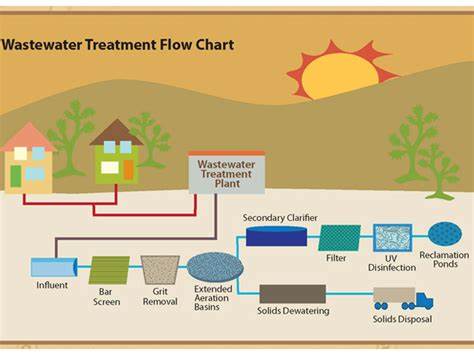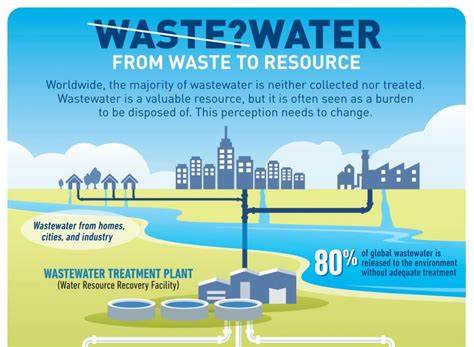
Environmental Benefits of Wastewater Treatment
Introduction
Wastewater treatment is a crucial process that plays a vital role in safeguarding the environment and preserving our natural resources. By effectively removing contaminants from wastewater, this process ensures that water bodies remain clean and healthy, leading to a multitude of environmental benefits. This comprehensive article explores the historical background, key concepts, and main discussion points related to wastewater treatment, as well as provides case studies, current trends, challenges, and future outlooks. Understanding the significance of wastewater treatment is essential for promoting sustainable practices and protecting our planet.
Historical Background
Throughout history, wastewater treatment practices have evolved significantly. From ancient civilizations utilizing rudimentary methods to modern technologies, the goal has always been to minimize the negative impact of wastewater pollution on the environment. Examples from history, such as the pollution of rivers and lakes due to untreated wastewater, have highlighted the urgent need for effective treatment methods. The detrimental effects of wastewater pollution on aquatic ecosystems and human health have further emphasized the importance of developing efficient treatment practices.
Key Concepts and Definitions
Wastewater treatment refers to the series of processes and methods used to remove contaminants from wastewater, ensuring its safe disposal or reuse. This comprehensive approach includes physical, chemical, and biological treatments that target various pollutants, such as suspended solids, organic matter, nutrients, and pathogens. The environmental benefits of wastewater treatment encompass the positive impacts it brings to the environment, including the preservation of water quality, protection of ecosystems, and mitigation of public health risks.

Main Discussion Points
Reduction of water pollution
Wastewater treatment plays a pivotal role in reducing water pollution by effectively removing harmful substances. Through processes like sedimentation, filtration, and disinfection, contaminants such as suspended solids, heavy metals, and organic compounds are eliminated. This ensures that treated wastewater released into natural water bodies complies with quality standards, safeguarding the health of aquatic organisms and reducing the overall pollution burden on the environment.
Protection of ecosystems and biodiversity
One of the significant environmental benefits of wastewater treatment is the protection of ecosystems and biodiversity. By removing pollutants from wastewater, treatment plants prevent the contamination of rivers, lakes, and coastal areas. Untreated wastewater can cause severe damage to aquatic ecosystems, leading to the loss of fish, wildlife, and plants. Wastewater treatment safeguards these delicate ecosystems, allowing them to thrive and maintain their biodiversity.
Enhancement of water quality and availability
Wastewater treatment plays a vital role in enhancing water quality and availability. By removing pollutants and improving water clarity, treated wastewater can be safely used for various purposes, such as irrigation and industrial processes. This reduces the reliance on freshwater sources, thereby conserving this valuable resource. Additionally, treated wastewater can be recycled and reused, further contributing to water availability in water-stressed regions.

Mitigation of public health risks
Effective wastewater treatment is essential for mitigating public health risks associated with untreated wastewater. Pathogens, including bacteria, viruses, and parasites, present in untreated wastewater can spread diseases and pose a significant threat to human health. By adequately treating wastewater, these pathogens are eliminated, preventing the transmission of diseases such as cholera, typhoid, and hepatitis.
Case Studies or Examples
Case study: Successful implementation of wastewater treatment in City X resulting in environmental benefits
In City X, the implementation of a robust wastewater treatment system has yielded remarkable environmental benefits. The treatment plant employs advanced technologies, including biological reactors and disinfection processes, to remove pollutants effectively. As a result, the quality of the river receiving the treated wastewater has improved significantly, leading to the recovery of aquatic life and the restoration of a once-polluted ecosystem.
Example: Impact of wastewater treatment on the restoration of a polluted river
In a polluted river that was once severely affected by untreated wastewater, the introduction of wastewater treatment has led to a remarkable restoration of its ecological balance. The removal of pollutants through treatment processes has allowed the river’s water quality to improve, supporting the revival of fish populations and the return of various wildlife species. This example showcases the transformative effect that wastewater treatment can have on restoring polluted water bodies.
Current Trends or Developments
Introduction of advanced treatment technologies
The field of wastewater treatment is constantly evolving, with new technologies being introduced to enhance its efficiency. Advanced treatment methods, such as membrane filtration, ultraviolet disinfection, and advanced oxidation processes, are becoming increasingly prevalent. These innovative technologies offer improved pollutant removal capabilities, energy efficiency, and reduced carbon footprint, further enhancing the environmental benefits of wastewater treatment.

Research on the reuse of treated wastewater for various purposes
Researchers are exploring the potential for treated wastewater to be safely utilized for various purposes, such as agricultural irrigation, industrial processes, and groundwater recharge. This research aims to maximize the utilization of treated wastewater, thereby reducing freshwater demand and promoting sustainable water management practices. Efforts are being made to address concerns related to public acceptance, water quality standards, and the implementation of appropriate treatment techniques for different reuse applications.
Challenges or Controversies
Cost-effectiveness and funding challenges associated with wastewater treatment
Despite its numerous benefits, wastewater treatment often faces financial challenges. The construction and maintenance of treatment plants require substantial investments, making it financially burdensome for some communities. Securing funding for treatment projects can be challenging, particularly in regions with limited financial resources. Addressing cost-effectiveness concerns and exploring innovative funding models are crucial to ensuring the widespread implementation of wastewater treatment systems.
Controversies surrounding the use of treated wastewater for agricultural irrigation
The use of treated wastewater for agricultural irrigation is a subject of debate and controversy. Concerns about potential health risks and the presence of pollutants in treated wastewater have led to hesitance in adopting this practice. However, proper treatment processes, adherence to stringent guidelines, and regular monitoring can minimize these risks and ensure the safe use of treated wastewater for irrigation. Public awareness and stakeholder engagement are essential in addressing these controversies and building trust in the practice.
Future Outlook
Potential advancements in wastewater treatment technology and practices
The future of wastewater treatment holds promising advancements in technology and practices. Research and development efforts focus on improving treatment efficiency, energy conservation, and resource recovery. Innovations such as decentralized treatment systems, resource-oriented sanitation, and bio-based treatment methods offer great potential for more sustainable and cost-effective wastewater management.
Importance of sustainable and decentralized wastewater management
The future of wastewater management lies in sustainability and decentralization. Integrating wastewater treatment into local communities and utilizing decentralized systems can reduce infrastructure costs, promote local water reuse, and enhance overall system resilience. Emphasizing sustainable practices, such as source-separation of waste and the utilization of renewable energy in treatment processes, will be crucial in ensuring a resilient and environmentally friendly wastewater management system.
Conclusion
Wastewater treatment plays a vital role in protecting the environment and preserving our natural resources. By reducing water pollution, safeguarding ecosystems, enhancing water quality, and mitigating public health risks, wastewater treatment provides significant environmental benefits. Through successful case studies, current trends, and innovative developments, the future of wastewater treatment holds great promise. However, addressing challenges surrounding cost-effectiveness, funding, and controversies related to reuse practices is essential for the widespread adoption of sustainable wastewater management strategies.




